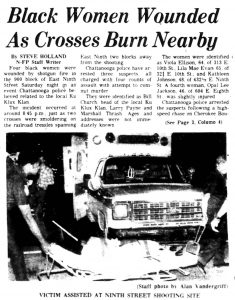This blog post was authored by Riley Grisham, an intern in the Library’s Special Collections unit from the UTC Department of English in Spring 2020.

On April 19, 1980, four Black women—Viola Ellison, Lela Evans, Opal Jackson, and Katherine Johnson—were shot as they exited the Whole Note Lounge on Ninth Street in Chattanooga, Tennessee. The people responsible for the shooting were three members of the Ku Klux Klan, who drove past the storied music club located on the Big Nine, as the street was called before it was renamed Martin Luther King, Jr. Boulevard in the early eighties. A fifth woman, Fannie Crumsey, was injured by flying glass when the Klansmen took aim at a parked car. All of the women survived, and the Klansmen were arrested and taken to trial, where they were charged with assault with intent to commit murder. An all-white jury acquitted two of the Klansmen, and the third member—the one who actually fired the gun—was sentenced to a mere nine months in jail in addition to a $225 fine. This verdict sparked four nights of protest.
The tide turned when, two years after the initial criminal trial, a civil trial occurred which culminated in the federal courts ordering the Klan to pay the women $535,000. The women were represented by Randolph McLaughlin, a lawyer from the Center for Constitutional Rights. McLaughlin and the women he was representing built their case around the Ku Klux Klan Acts of 1871, which were intended to enforce the 14th Amendment and provide civil and political protection for freed slaves. Despite the fact that the Ku Klux Klan Acts were passed in 1871, the 1980 lawsuit was the first time that any plaintiff succeeded in receiving any monetary relief from such a suit, making the efforts of these Chattanooga women and their attorney a crucial turning point in the ongoing fight for social justice.
Join Us
On Thursday, February 20th, from 5:30-7:00 PM, Randolph McLaughlin will be speaking about the historic trial at the Bessie Smith Cultural Center in a presentation entitled “Black Heroines for Justice: 1980s Terrorism of the Ku Klux Klan in Chattanooga and the Women Who Stood Against Them.” According to McLaughlin, this is the first time he has been asked to speak publicly on the trial. The event is free and open to the public.
Let us know you’re attending by RSVPing for the event on MocSync or Facebook.
Contribute
Tiffany Herron, a UTC graduate student, is working with Special Collections to record and preserve interviews with people willing to speak about the shooting and trial. If you are interested in helping us preserve our shared history, please contact Ms. Herron at [email protected].
Learn More
Ryan, Shawn, “1980 Shooting of Black Women the Focus of Feb. 20 Event,” UTC College of Arts & Sciences Blog, February 10, 2020, https://blog.utc.edu/news/2020/02/1980-shooting-of-black-women-the-focus-of-feb-20-event/.
“The Ku Klux Klan Act of 1871,” History, Art, and Archives: United States House of Representatives, accessed February 10, 2020, https://history.house.gov/HistoricalHighlight/Detail/15032451486?ret=True.
Holland, Steve, “4 Shot on 9th Street.; KKK Linked,” Chattanooga News-Free Press, April 20, 1980.